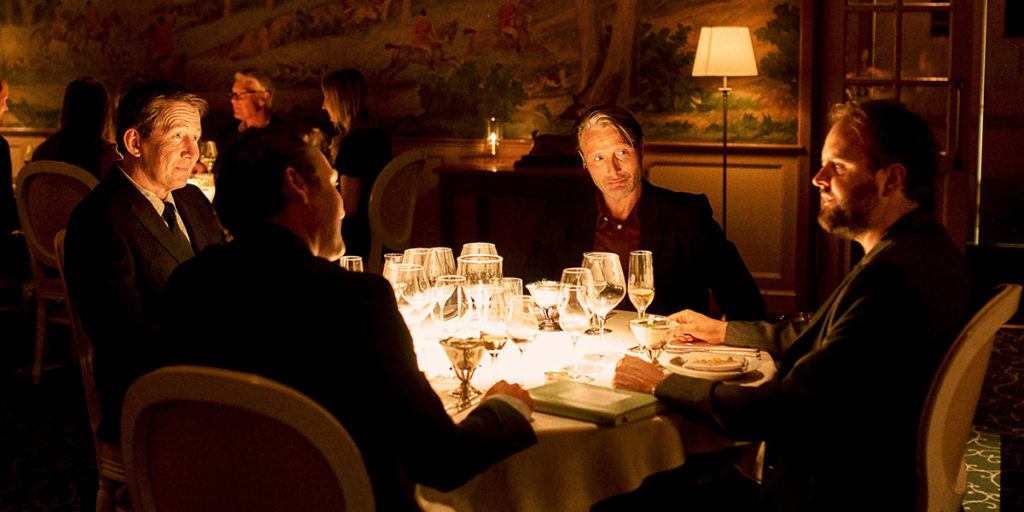Another Round

Image courtesy TIFF.
“Have I become boring?” Martin (Mads Mikkelsen) asks his wife, Trine (Maria Bonnevie).
A high school history teacher, he grapples with depression and some kind of mid-life crisis. Out at dinner with his fellow teachers, Nikolaj (Magnus Millan), Tommy (Thomas Bo Larsen), and Peter (Lars Ranthe), the others start getting into the wine. Martin hesitates. Has he never had a drink? Does he struggle to stay sober? Or is he a functioning alcoholic whose sobriety leaves him thinking he can’t entertain without a few in him.
Nikolaj, who teaches psychology, notes that Norwegian psychiatrist Finn Skårderud claims that human beings are short 0.05% Blood Alcohol Content (BAC), and should therefore consume alcohol throughout the day to function optimally. The three educators make a pact—like teenagers in a buddy comedy—to put this hypothesis to the test. They each agree to consume the requisite amount to close the gap on the alleged deficiency, but, as you might guess, their alcohol consumption doesn’t stop there.
When taken in small doses, alcohol causes vasodilation—like a stimulant. They become more inventive with their teaching methods. Martin bursts into energetic dialogues with his students about Churchill, FDR, and other World War II figures. Tommy rallies his elementary school soccer team like Eisenhower commanding his troops—leading even his bespectacled underdog to score a goal.
“We’re not alcoholics,” says Nikolaj. “We decide when we want to drink. An alcoholic can’t help himself.”
Peter, the music teacher, admires concert pianist Klaus Heerfordt. Nikolaj remarks, “He could only play at the exact point of being neither drunk nor sober. And he was absolutely brilliant.”
Looking at Martin, he continues, “And you want to take this to the Tchaikovsky level.”
Convinced of themselves, the teachers move forward with phase two, gradually exceeding the original boundary. Here the film cuts to a montage of political leaders three sheets to the wind. Boris Yeltsin, who oversaw the most tumultuous reconstruction period immediately following the dissolution of the Soviet Union, appears plastered next to President Clinton—unable to contain his laughter. I’m no expert in Russian, but even I can tell that Leonid Brezhnev, addressing Soviet youth on New Year’s Eve, 1979, slurs his words.
Martin argues that the men may have different tolerances to alcohol, and therefore their creativity may not peak at the same BAC. As beer gives way to wine, wine gives way to liquor. In phase three, mixing round after round of Sazerac, they go for “Maximum BAC.” When taken in large doses, dehydration and vasoconstriction follow, acting like a depressant—eventually causing irritability and rage. But, as one warns that excessive drinking causes some to expire, others to crave, the group blows past 0.12% BAC. They begin to unravel.
But, as the experiment unhinges them—walking into walls in the teachers’ lounge, falling down in a liquor store, shouting at family—they shift from social drinkers to problem drinkers . Evincing the parallel to Martin’s talk of charismatic world leaders, underneath the surface the men slowly become monsters.
“The world,” says Martin to his students, “is never as you expect.”
Director Thomas Vinterberg—whose 2012 drama and Toronto International Film Festival entrant, THE HUNT, also starred Mikkelsen—poignantly deconstructs the mid-life crisis with equal parts humor and introspection. The characters engage us. They’re trying, in earnest, to be interesting, to make a difference in their students’ lives. Mikkelsen’s performance radiates, vacillating to the extremes of depression and mania with believable restraint. A trained gymnast and dancer, Mikkelsen contrasts Martin’s lows with gyrating and leaping highs. To the tune of “Cissy Strut” by The Meters, the quartet persuades us to dance, too. Just be careful where you leap.
ANOTHER ROUND premieres in North America at the 45th Toronto International Film Festival.